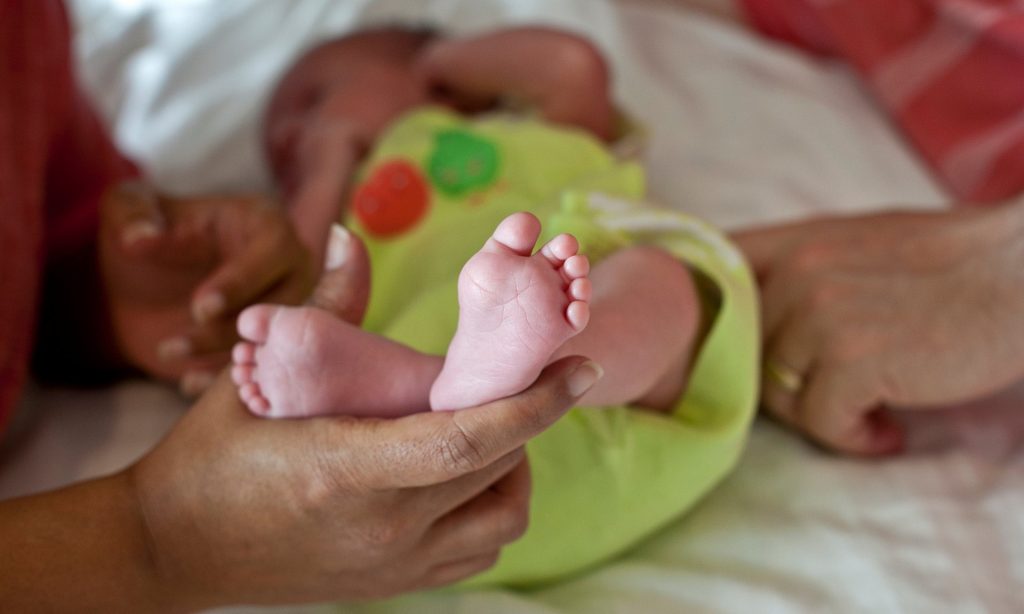
Photograph: Allison Joyce/AP
After a long day of selling snacks at her son’s primary school, Kew, who is seven months pregnant, squats on the Bangkok pavement to take a rest. The single mother has no idea whose baby she is carrying, or where its future parents live. She says it makes no difference to her.
“The first time I did surrogacy, I discovered that the baby was for a Spanish couple. Two gay men,” she says. “For me it’s all the same, as long as I get paid.”
In two months the 26-year-old will receive the final instalment of her 300,000 baht (£6,600) surrogacy fee. It will be enough to finally pay off the loan sharks who make her mother’s life in northern Thailand miserable. She may even buy some land. “No other job lets you earn this kind of money,” says Kew, who earns of about 250 baht a day from her food stall.
Kew says she is not aware that Thailand banned commercial surrogacy for foreigners last year. All she knows is that for this, her second surrogacy, her agency flew her to neighbouring Cambodia for the embryo transfer. “I think I will also have to deliver the baby there.”
With surrogacy bans now in place in Thailand, India and Nepal, the business is being pushed across borders.
“Many would-be parents whose budget limits them to Asia have no other options than to try their luck in Cambodia, especially gay couples,” says Sam Everingham, director of the Australian non-profit organisation Families Through Surrogacy, which informs aspiring parents on overseas surrogacy options.
Everingham has observed how agencies and clinics forced to close in Thailand simply moved their lucrative business into Cambodia, where infertility treatment was non-existent until two years ago.
Today, clinics in the capital, Phnom Penh, are offering IVF and embryo-transfers, and agencies offer services for overseas couples. Some claim to be fully booked for months. Here, surrogacy packages start at $33,000 (£25,400), compared with $90,000-$150,000 in the US.
On agency websites, “travelling surrogates” like Kew are advertised. But, like her, these women may lack clear information about the job they have signed up for.
“We have to be aware that surrogacy is a foreign concept in Cambodia. No laws are in place to regulate the process, leaving both parents and surrogates unprotected,” warns Everingham.
For Preeti Bista, owner of the Nepalese surrogacy agency My Fertility Angel, the unclear rules and low costs are precisely what make Cambodia an attractive place to set up what she says will be an ethical surrogacy business. “Since surrogacy has been put on hold in Nepal, I have both desperate surrogates and parents calling me non-stop, asking me if I can help them. I am now trying to do just that in Cambodia. The key is to provide transparency to all parties involved.”
Bista has been accused of exploiting people’s poverty and lack of options. She says all she does is to help people have babies – “the most beautiful thing in the world”.
There is no doubt that the money for poorer surrogates can be life-changing. The fee from surrogacy for Baimon, 33, a fish farmer, meant she and her husband were able to invest in a new commercial fish pond, south of Bangkok. “I also bought new freezers,” she says. “Fish prices are low, so the only way for us to survive is to invest.”
Baimon has delivered surrogate twins for two couples – the second C-section took place 4,000 miles from home, in Moscow. She is aware of the ban in Thailand and is hesitant about a third pregnancy, saying the new regulations make the endeavour more risky.
“Why can we not protect surrogate mothers better instead of banning the practice?’’ she asks. “Now we will lose all this money to other countries. But to some young women, making a family happy is still better than being a prostitute or dancing in the go-go bars.’’
Por, a corn picker from a town five hours south of Bangkok, keeps a photo of her surrogate child. “A big nose and light-coloured hair, just like her daddy,” she whispers. “After they left I cried for three days straight.’’ Even now, says Por, “I miss this little girl like she is my own.”
Despite the heartache, the 33-year-old is eager to do a second commercial pregnancy. Filling 100kg bags of corn in the sun every day is hard work.
“As a surrogate I feared the hospital visits and medicines – but still, life was easier,” she says. In addition to the main fee of 250,000 baht, each month there was a payment of 15,000 baht, which the agency encouraged her to spend on healthy groceries.
Besides the required hospital visits, Por doesn’t recall any other instructions from her agency. She did not receive any counselling on the potential emotional toll of surrogacy, or any explanation on the legal (guardianship) papers she had to sign.
“Occasionally, my contact person would give me a call to check how I was feeling, but that was all.” In the meantime, she was working in the fields and taking care of her own two boys. “I will do it a second time, even if I have to travel to another country for it,” she says, adding that she does it for the money, but also because the baby’s Australian parents told her she had given them a precious gift.
But how long Cambodia can be Asia’s new surrogate haven remains to be seen. “Only one scandal has to surface and the whole thing will fall apart,” says Bista. And when that happens, the agencies, clinics and travelling surrogates will pack their bags and head elsewhere. “I am sure [they] will,” she adds, “because no matter how many bans there are, you can never make people’s wish to start a family disappear.”
- Some names have been changed

